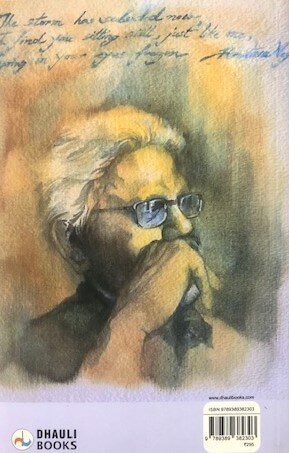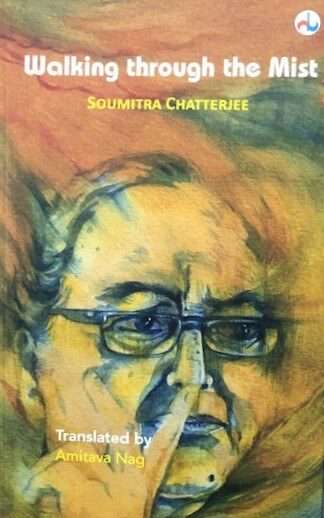Reading Time: 5 minutes
Gopal reviews a poetry book, ‘Walking through the Mist’, by actor-poet Soumitra Chatterjee, and translated into English from Bangla by Amitava Nag. An exclusive for Different Truths.

Book: Walking through the Mist
Author: Soumitra Chatterjee
Translated by: Amitava Nag
Poetry is a delicate art of weaving words together. It reveals itself ever so slowly, touching our lives in every turn. At the same time, it also helps identify the state of the society. To Jordan Ellenberg, the eminent mathematician, geometry is like poetry; able to mould and delight the human mind.
There can be no better example than Soumitra Chatterjee, a legendary Bengali actor, playwright, poet, painter, editor.
There can be no better example than Soumitra Chatterjee, a legendary Bengali actor, playwright, poet, painter, editor. Long admired for its sensitivity, his works carry with it the rhythms and geometry of life. His sensitive and powerful poems express directly as one human being to another and finds his way to write socially conscious poems so adroitly.
The actor-poet once confessed to another eminent Bengali poet Joy Goswami, “During acting, I want to shield myself behind the character, as if that character is my mask. While writing poems, I expose myself, I try to break away from that façade – writing poetry is like freedom to me.”
Amitava Nag’s English translation has beautifully captured the spontaneity and confiding intimacy of the Bangla poems.
Everywhere you see the poets’ extraordinary observations in his charming collection of poems titled ‘Walking through the Mist’. Amitava Nag’s English translation has beautifully captured the spontaneity and confiding intimacy of the Bangla poems.
Lucid Translation
Translator/traitor is a well-worn phrase, but Amitava Nag’s translation is moulded by harmony and integration. The expansion of one’s sensitivity to the rhythms of language is well-amplified in this book. While translating, to register and capture the source text is important and here the translator has been able to replicate the lucidity and allure of the original.
Soumitra Chatterjee had more than twenty collections of poems. The translator has mentioned in his Introduction, “For the collection I chose the poems that appealed to me most for their passionately dispassionate rendering of the solitary man, struggles, his defeats and his eternal quest to rise from the ashes.”
…these understated poems can find a minimal application of juxtaposition that meditates between body and soul.
Moreover, these understated poems can find a minimal application of juxtaposition that meditates between body and soul. And the poet’s rhythms relate closely to the feelings of experience. In Chatterjee, each chosen words reverberates with other rich complexities. And in the poetry lies the poet’s artistic contribution.
Free-flowing Poems

The poet, in general, lets the poetry flow almost unchecked, so that the readers can imagine themselves transported to the place of poet’s interest. His poetic landscape is vividly real and visible. But it is also carefully coloured and symbolic. And the release of new forces of affirmation and hope is elaborated and perfected.
‘Now, in the mist I search
For the times lost
Between you and me.’ (Walking through the mist)
There are a few poems, personally, I’d have favoured them more concise and crisper. But they do play a significant poetic role, conveying the readers by the power of words alone. The following poem is a good example.
When the city goes to sleep
I return every night to my memories,
Wait with outstretched hands- if the deceased speak again,
If the forgotten return, once more. (Waiting in reverence)
Vibrant and Dreamlike
Vibrant and dreamlike, his poems are sometimes a brief incursion into human irrationality and embellishment. We may find ourselves incriminated at the end of the following poem and at the edge of his poetic landscape. There is a sharp sense of rift. And the rift is followed by darkness.
‘Then, gravity will be dense,
Love will collapse into blackholes,
Pictures
Words
Stars- all will squirm in thirst for freedom.’ (In my darkness)
The revisiting, the insinuation, the heaving something from the past are realities in his poems.
For a poet, ‘Poetry helps me repay my debts to my people.’ The revisiting, the insinuation, the heaving something from the past are realities in his poems. ‘A day will come/I am no longer here, / A different khalasi greets/Kopai anew.’
And that pathos is indelible.
To empathise with a protagonist is to see the world from another’s viewpoint. His beliefs and customs are different from ours. And that kind of intimate understanding definitely serves a moral function.
But moments of ephemeral beauty and losses are handled with equal skill in the following poem.
‘Garlanding him with beads of absence
Forest whispers again-
All the songs that I snatched away from your voice
Are here, in this silent wreath.’ (Silent wreath)
Reel-life Experiences
Like in films, his poetry moves within its own images through what is concrete and factual, as reel-life experience itself. It just shows allegories, symbols and the reality into time flux. It goes on reaffirming its own structural totality.
His poems are at times artful, engaging and bracingly resonant.
His poems are at times artful, engaging and bracingly resonant. The poet confesses, ‘However, the road to fruition for every poem is not the same. For a few the process is complex and painful. For many others, it is simple and natural.’
The variety and richness of the following poem’s melodic flow stand out.
‘Some days
A river wakes up in this body,
Breaks down the banks,
All that were safe
Flew away in torrents,’ (Some days)
The varied depths of darkness acquired by alphabets seem to metaphorically fuse the bloodshed with that of the palm.
The varied depths of darkness acquired by alphabets seem to metaphorically fuse the bloodshed with that of the palm. There is the fear always lurking around, ‘A fear steals him in entirety/Keeps him in the dark, /Blinds him.’ The poet’s confessions and emotions come gushing forth in the following poem. Furthermore, it conveys a unified sense of self with an almost painful emotional honesty.
‘One day I told the alphabets to write my sorrow,
To find melancholy letters washed away in bloodshed,
The palm over the wooden block in nailed
Incessantly.’ (Incessant nailing of the palm)
Refreshing Thoughts and Clarity
Most of the poems resonate in the lightness of touch, bold expressions, refreshing thoughts, clarity and precision. A strand of compassion runs through his poems at times. Because they are deeply felt and clearly expressed. A haunting, intriguing poem follows,
‘Before writing down the whole of it
I wish to hoodwink terror,
Enjoy with the young,
Drawing chariots, waving paper flags,
Then what remains is nothing
But,
Only an insignificant conclusion’. (What remains)
He speaks of pain, shame, and fear with sometimes a startling vulnerability.
He speaks of pain, shame, and fear with sometimes a startling vulnerability. Some of the poems trace the inability to convey traumas and the crisis of the commoners.
‘Rather, it is better, not to write any more,
I fail to explain anything through my writing,
Speaking is even more tiring.
In this winter night I wait silently, wrapped- ‘(Fatigue)
Emotive and Assured
In this emotive and assured collection of poems, the poet deftly stirs the inner workings and progressive immobility. It is as if a journey through endless scenes of the human elements arrested and transformed in poetic form.
Rummage all belongings,
Overhaul debris- fake diamonds, broken chandelier,
Find that elusive brightness,
Hiding somewhere-
In silence. (What will you live with?)
Perhaps more than most genres, poetry depends for its power on the precision of words and language.
Perhaps more than most genres, poetry depends for its power on the precision of words and language. ‘Walking through the mist’ is a sensitive excavation of a greater universal humanism. In a compassionate but nuanced telling, the book draws the precise emotional contours of life with soul and spirit and offers grounds for hope. Amitava Nag’s English translation is constantly alert to the nuances of the Bengali language and the cultural context.
The painterly cover art is impressive. And surely, to read this book is actually to accompany the poet on his journey through the mazes of life.
Photos sourced by the reviewer

















It takes one outside the limits of language but “that” fails to takes …
And the failure of “that” to take place is its brilliance ……